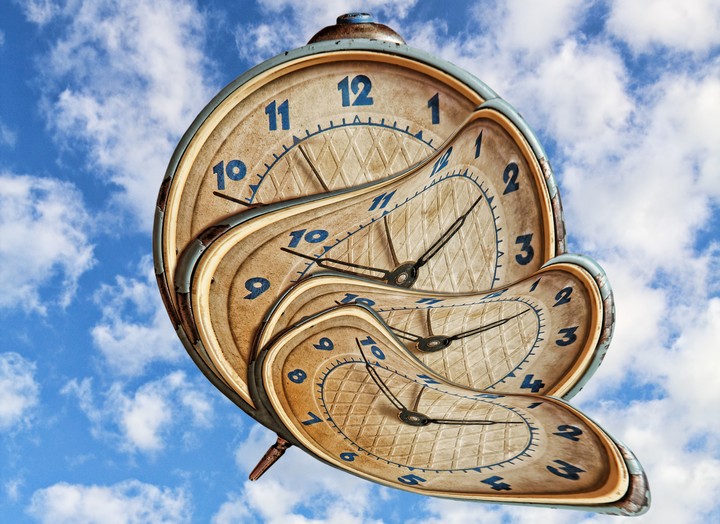LSD Changes Something About The Way You Perceive Time
We measure time in set amounts— seconds, minutes, and hours. But the way time feels is more slippery.

Grotmarsel/ Getty
In 2015, when cognitive neuroscientist Devin Terhune was hit by a car, the impact took less than a second, but he felt it to be much longer.
“I was riding [my bike] very fast, and so when I hit the car I went flying back around 15 feet or more,” he says. “Objectively, I’m sure the whole thing probably unfolded in less than a second but I experienced flying through the air as lasting at least 5 seconds—it felt very slow.”
Time stretched out from milliseconds to seconds and Terhune lived first-hand something we experience in less dramatic ways each day. We measure time in set amounts— seconds, minutes, and hours. But the way time feels is more slippery. Ten minutes while you’re bored is an eternity and those same ten minutes with your best friend disappear like nothing.
This flexibility in perceiving time is only enhanced when psychedelic drugs enter the mix. A review from 1964 on hallucinogens reveals how long we’ve been playing with the dials of time—speeding it up, and slowing it down—through drugs. One account from 1913 on mescaline intoxication said that mescaline made a person feel like “the immediate future was rushing on at chaotic speed, and the time was boundless.”
A study from 1954 found time disorders in 13 out of 23 people under the influence of psychedelics. Most of them felt a “sense of temporal insularity,” where only the present was real and the past and future were far, far away. “One subject experienced a ‘timeless, suspended state; a few felt time to be slipping away very quickly, whilst in others the passage of time was slowed down,” the review wrote. “In one case where the mood fluctuated between elation and depression, the passage of time was experienced concurrently as rapid and slow.”
The perception of time is a fundamental process of the brain, linked tightly to attention, emotions, memory, psychiatric and neurological disorders, and even consciousness—but while scientists have been anecdotally noting how drugs can change time perception for decades, very few have been able to address the question rigorously with tightly designed studies.
Terhune says he’s been interested in understanding the neurochemical mechanisms involved in the distortions in the perception of time, and these drugs are one way to do that. Psychedelics act on specific pathways and chemicals in the brain, and if they also change the perception of time, we could learn exactly how it happens.
At the end of November, Terhune and his co-authors published a randomized, double-blind, placebo-controlled study in Psychopharmacology on the effects of microdoses of LSD on people’s perception of time. They found that even at small doses, LSD seems to change the way people interpret time, though the specifics of how and when are still to be determined.
In the new work, 48 healthy people were split up into four groups. One group got a placebo, and the other three received different small doses of LSD: 5, 10, or 20 micrograms. Then, they did what’s called a temporal reproduction task. In this task, you see something on a screen for a certain amount of time—in the study it was a blue circle—and are asked to remember and recreate how long you saw it.
The participants were shown a blue circle for periods of time from 800 milliseconds all the way up to 4,000 milliseconds, in increments of 400 milliseconds. “So, this blue circle would appear on the screen for, say, 1,200 milliseconds, or 1,600 milliseconds, whatever it might be,” Terhune says. “The participant had to focus on that, estimate and memorize that duration.” They would then hold the space bar down on the computer for the same amount of time they saw the circle.
Terhune and his colleagues looked to see how accurate the different groups of people were in reproducing those intervals, and found that the people in the LSD groups tended to hold down the space bar for significantly longer periods of time than the placebo condition. The researchers call this “over-reproduction.”
Importantly, Terhune says that they saw these changes in time perception without any major conscious effects from the drug. They asked people to report if they felt anything from taking the LSD, like perceptual distortions, unusual thoughts, if they felt high, or if it affected their concentration. There were a couple of weak effects, but statistically, the change in time perception happened independent of any subjective influence of the drug.
In previous work on time perception and hallucinogens, a factor that complicated interpretation were the strong effects from the drugs themselves. When time perception changed for people in those studies, was it truly because their perception had changed, or was it rather that their attention had shifted, for instance, to a strange visual hallucination across the room?
(…)
https://www.vice.com/en_us/article/j5zd7p/lsd-changes-something-about-the-way-you-perceive-time?utm_source=stylizedembed_vice.com&utm_campaign=qv7jkx&site=vice